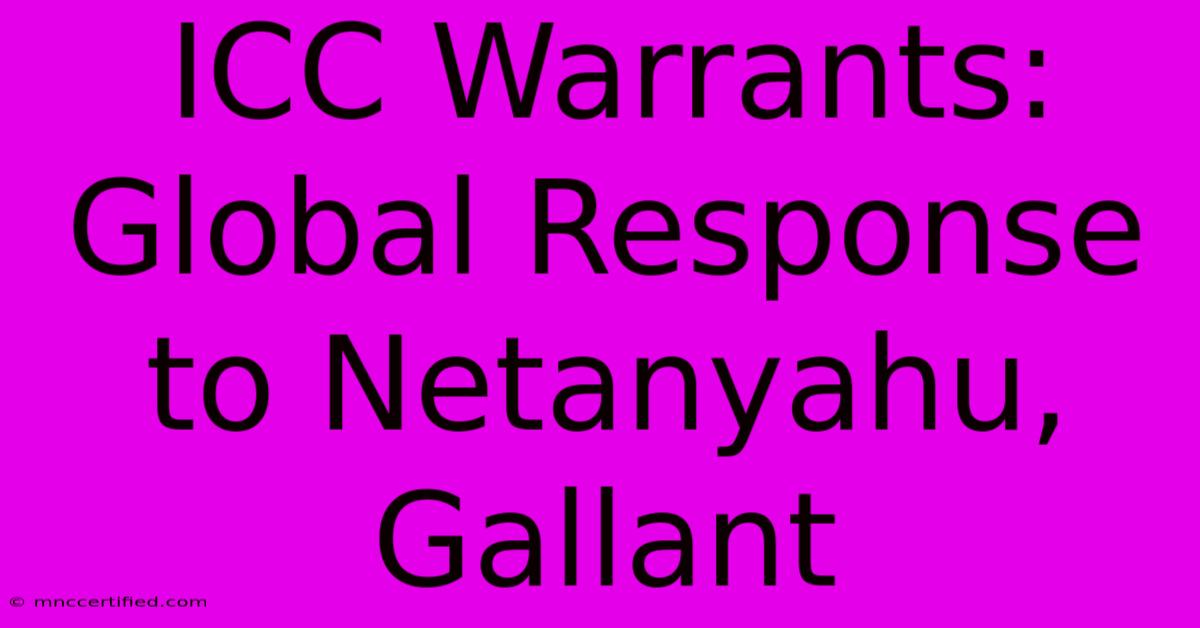ICC Warrants: Global Response To Netanyahu, Gallant

Table of Contents
ICC Warrants: Global Response to Netanyahu and Gallant
The International Criminal Court's (ICC) issuance of arrest warrants for Israeli Prime Minister Benjamin Netanyahu and Defense Minister Yoav Gallant has sent shockwaves through the international community, sparking a heated debate about international law, Israeli-Palestinian conflict, and the role of the ICC. This article will delve into the details of the warrants, the global reaction, and the potential implications for the region and international relations.
Understanding the ICC Warrants
The ICC warrants, issued on [Insert Date of Warrant Issuance], allege war crimes related to the Israeli government's policies in the occupied Palestinian territories. Specifically, the charges center around [Specifically mention the alleged crimes, citing official ICC documentation if possible, e.g., "the illegal transfer of civilians into the occupied territories," or "the destruction of Palestinian property"]. These accusations are serious and far-reaching, potentially impacting the legal and political standing of both Netanyahu and Gallant on the global stage. It is crucial to note that these are allegations, and both individuals are presumed innocent until proven guilty.
Key Allegations and Evidence
The ICC's investigation, which has been ongoing for several years, relies on a complex body of evidence. This includes [Mention types of evidence used by the ICC, e.g., witness testimonies, satellite imagery, official documents]. The specifics of this evidence are not yet publicly available in their entirety, due to the ongoing nature of the investigation and the need to protect witnesses. However, the ICC's Prosecutor's Office has indicated that sufficient evidence exists to justify the issuance of the arrest warrants.
Global Response: A Divided World
The ICC's action has elicited a strong and divided response from the international community.
Supporters of the Warrants
Many countries, particularly those with strong human rights records and a commitment to international law, have expressed support for the ICC's investigation and the issuance of the warrants. These nations argue that holding individuals accountable for alleged war crimes is essential for upholding international justice and deterring future atrocities. The principle of universal jurisdiction, which allows states to prosecute individuals for crimes committed elsewhere, is frequently cited in support of the ICC’s actions.
Opponents of the Warrants
Conversely, several countries, primarily allies of Israel, have condemned the ICC's decision. They argue that the ICC lacks jurisdiction in this case, citing Israel's claim that it is not a party to the Rome Statute (although the court's jurisdiction extends to situations where crimes are committed on territories under the de facto control of a state party, which is relevant in this instance). Concerns about bias and political motivation within the ICC's investigations are also frequently raised. Israel itself has vehemently rejected the warrants, stating that they are politically motivated and a violation of its sovereignty.
Implications and Future Outlook
The issuance of these warrants has significant implications for several key areas:
Impact on the Israeli-Palestinian Conflict
The ICC's action is likely to further exacerbate the already tense situation between Israel and Palestine. It could potentially hinder peace negotiations and increase tensions in the region. The warrants add another layer of complexity to an already intractable conflict.
Impact on International Relations
The differing global responses highlight the divisions within the international community regarding international justice and the ICC's role. This could strain relationships between countries supporting and opposing the warrants. The debate also raises questions about the effectiveness and legitimacy of the ICC in addressing complex geopolitical conflicts.
Legal Challenges and Next Steps
The warrants' legality and enforceability are likely to face legal challenges. Israel, along with several of its allies, is expected to contest the ICC's jurisdiction and the evidence presented. The process of apprehending and prosecuting Netanyahu and Gallant, should they travel to countries that are party to the Rome Statute, will be a complex and potentially contentious undertaking.
Conclusion:
The ICC warrants for Netanyahu and Gallant represent a significant development in the Israeli-Palestinian conflict and international law. The global response demonstrates the deep divisions surrounding international justice, the ICC's role, and the pursuit of accountability for alleged war crimes. The long-term implications of this decision remain to be seen, but it is certain to continue shaping the discourse and dynamics of the conflict for years to come. Further developments in this ongoing legal and political drama will be crucial to monitor.

Thank you for visiting our website wich cover about ICC Warrants: Global Response To Netanyahu, Gallant. We hope the information provided has been useful to you. Feel free to contact us if you have any questions or need further assistance. See you next time and dont miss to bookmark.
Featured Posts
-
A Man On The Inside Review And Analysis
Nov 22, 2024
-
Morgan Renters Insurance Program
Nov 22, 2024
-
Nc State Football Georgia Tech Trip
Nov 22, 2024
-
14 5 Million E On Meter Failure Payout
Nov 22, 2024
-
Trumps Ag Pick Gaetz Withdraws
Nov 22, 2024